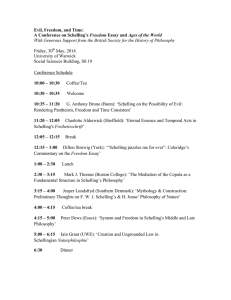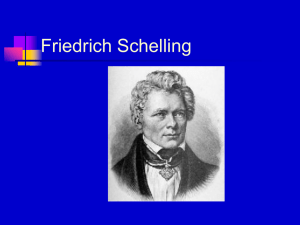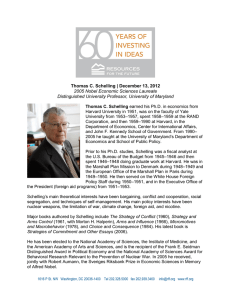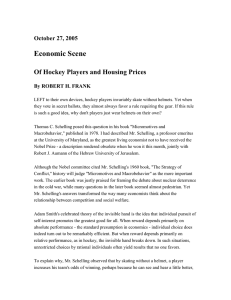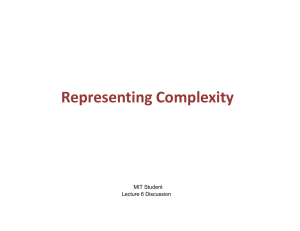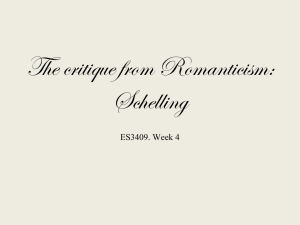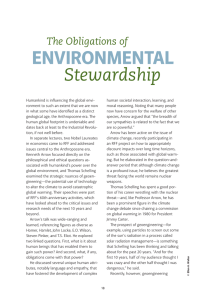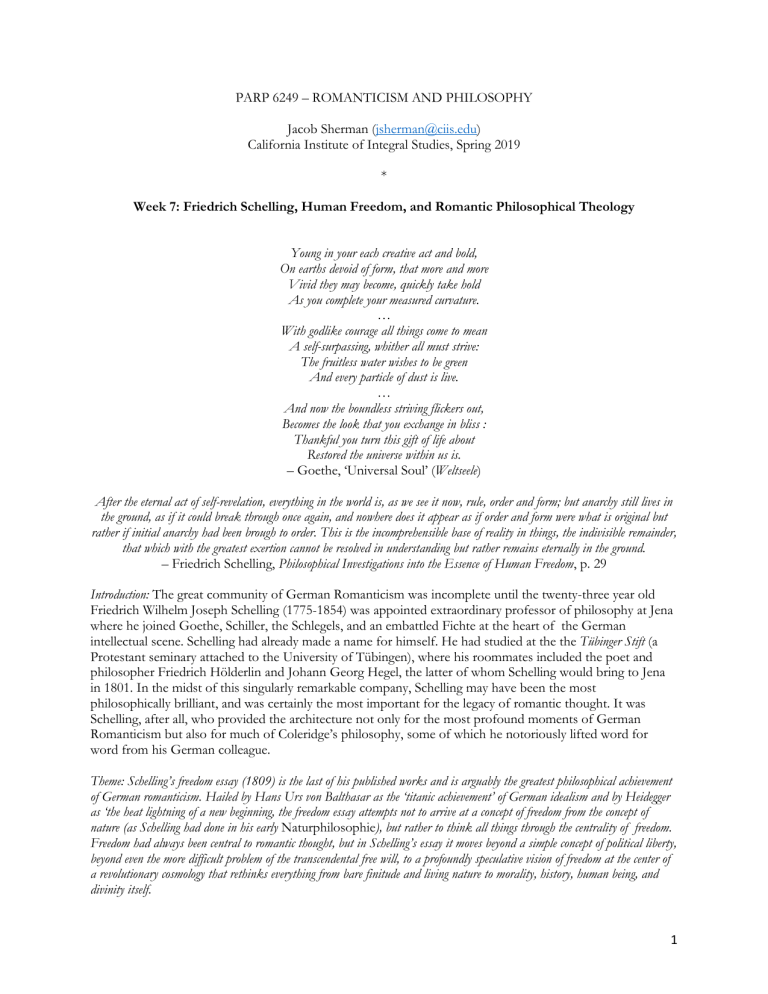
PARP 6249 – ROMANTICISM AND PHILOSOPHY Jacob Sherman (jsherman@ciis.edu) California Institute of Integral Studies, Spring 2019 * Week 7: Friedrich Schelling, Human Freedom, and Romantic Philosophical Theology Young in your each creative act and bold, On earths devoid of form, that more and more Vivid they may become, quickly take hold As you complete your measured curvature. … With godlike courage all things come to mean A self-surpassing, whither all must strive: The fruitless water wishes to be green And every particle of dust is live. … And now the boundless striving flickers out, Becomes the look that you exchange in bliss : Thankful you turn this gift of life about Restored the universe within us is. – Goethe, ‘Universal Soul’ (Weltseele) After the eternal act of self-revelation, everything in the world is, as we see it now, rule, order and form; but anarchy still lives in the ground, as if it could break through once again, and nowhere does it appear as if order and form were what is original but rather if initial anarchy had been brough to order. This is the incomprehensible base of reality in things, the indivisible remainder, that which with the greatest exertion cannot be resolved in understanding but rather remains eternally in the ground. – Friedrich Schelling, Philosophical Investigations into the Essence of Human Freedom, p. 29 Introduction: The great community of German Romanticism was incomplete until the twenty-three year old Friedrich Wilhelm Joseph Schelling (1775-1854) was appointed extraordinary professor of philosophy at Jena where he joined Goethe, Schiller, the Schlegels, and an embattled Fichte at the heart of the German intellectual scene. Schelling had already made a name for himself. He had studied at the the Tübinger Stift (a Protestant seminary attached to the University of Tübingen), where his roommates included the poet and philosopher Friedrich Hölderlin and Johann Georg Hegel, the latter of whom Schelling would bring to Jena in 1801. In the midst of this singularly remarkable company, Schelling may have been the most philosophically brilliant, and was certainly the most important for the legacy of romantic thought. It was Schelling, after all, who provided the architecture not only for the most profound moments of German Romanticism but also for much of Coleridge’s philosophy, some of which he notoriously lifted word for word from his German colleague. Theme: Schelling’s freedom essay (1809) is the last of his published works and is arguably the greatest philosophical achievement of German romanticism. Hailed by Hans Urs von Balthasar as the ‘titanic achievement’ of German idealism and by Heidegger as ‘the heat lightning of a new beginning, the freedom essay attempts not to arrive at a concept of freedom from the concept of nature (as Schelling had done in his early Naturphilosophie), but rather to think all things through the centrality of freedom. Freedom had always been central to romantic thought, but in Schelling’s essay it moves beyond a simple concept of political liberty, beyond even the more difficult problem of the transcendental free will, to a profoundly speculative vision of freedom at the center of a revolutionary cosmology that rethinks everything from bare finitude and living nature to morality, history, human being, and divinity itself. 1 SELECT BIBLIOGRAPHY OF PRIMARY TEXTS BY SCHELLING Schelling, F.W.J. Philosophical Investigations into the Essence of Human Freedom. Translated by Jeff Love and Johannes Schmidt. Albany, N.Y.: State University of New York Press, 2006. ———. The Ages of the World. Fragment, from the Handwritten Remains. Translated by Jason M. Wirth. Suny Series in Contemporary Continental Philosophy. Third Version (c. 1815) ed. Albany: State University of New York Press, 2000. ———. System of Transcendental Idealism. 1993. ———. Clara, or, on Nature's Connection to the Spirit World. Suny Series in Contemporary Continental Philosophy. Albany: State University of New York Press, 2002. ———. Historical-Critical Introduction to the Philosophy of Mythology. Suny Series in Contemporary Continental Philosophy. Albany: State University of New York Press, 2007. ———. On the History of Modern Philosophy. Translated by Andrew Bowie. Cambridge: Cambridge University Press, 1994. ———. Idealism and the Endgame of Theory : Three Essays. Edited by Thomas Pfau. Albany: State University of New York Press, 1994. ———. The Ages of the World. Edited by Jason Wirth. Albany: State University of New York Press, 2000. SELECT BIBLIOGRAPHY OF SECONDARY TEXTS Beach, Edward Allen. The Potencies of God(S) : Schelling's Philosophy of Mythology. Suny Series in Philosophy. Albany, NY: State University of New York Press, 1994. Beiser, Frederick C. German Idealism : The Struggle against Subjectivism, 1781-1801. Cambridge, Mass.: Harvard University Press, 2002. Bowie, Andrew. Schelling and Modern European Philosophy. London: Routledge, 1993. Brown, Robert F. The Later Philosophy of Schelling: The Influence of Boehme on the Works of 1809-1815. Cranbury, NJ: Bucknell University Press, 1977. Day, Jerry. Voegelin, Schelling, and the Philosophy of Historical Existence. Eric Voegelin Institute Series in Political Philosophy. Columbia: University of Missouri Press, 2003. Ffytche, Matt. The Foundation of the Unconscious : Schelling, Freud, and the Birth of the Modern Psyche. Cambridge ; New York: Cambridge University Press, 2012. Gabriel, Markus, and Slavoj Žižek. Mythology, Madness, and Laughter : Subjectivity in German Idealism. London ; New York: Continuum, 2009. Grant, Iain Hamilton. Philosophies of Nature after Schelling. Transversals : New Directions in Philosophy. London: Continuum International Pub. Group, 2008. Heidegger, Martin. Schelling's Treatise on the Essence of Human Freedom. Series in Continental Thought. Athens, OH: Ohio University Press, 1985. McGrath, S. J. The Dark Ground of Spirit : Schelling and the Unconscious. Hove ; New York, NY: Routledge, 2012. Norman, Judith, and Alistair Wlechman, eds. The New Schelling. London: Continuum, 2004. Schindler, D. C. The Perfection of Freedom : Schiller, Schelling and Hegel between the Ancients and the Moderns. Veritas. Eurene, Or.: Cascade Books, 2012. Wirth, Jason M. The Barbarian Principle : Merleau-Ponty, Schelling, and the Question of Nature. Suny Series in Contemporary Continental Philosophy. Albany: SUNY Press, 2013. ———. The Conspiracy of Life : Meditations on Schelling and His Time. Suny Series in Contemporary Continental Philosophy. Albany, NY: State University of New York Press, 2003. ———. Schelling Now : Contemporary Readings. Studies in Continental Thought. Bloomington, IN: Indiana University Press, 2005. ———, ed. Schelling Now: Contemporary Readings. Bloomington: Indiana University Press, 2005. Žižek, Slavoj. The Indivisible Remainder : An Essay on Schelling and Related Matters. London ; New York: Verso, 1996. 2 ‘World Soul’ (‘Weltseele,’ c. 1801; published 1806) Go forth, now that this holy feast is done, Into all regions of the world disperse; Stop not in purlews with your inspiration, Enter the All, make full the universe ! Vast distances already loft your flight; Under the stars, together, as you race You float the dream of gods, and you give light In light-inseminated outer space. Urge ever onward then, as mighty comets; Your course will intersect, as on it runs, Pressing against the far and farther limits, The labyrinth of planets and of suns. Young in your each creative act and bold, On earths devoid of form, that more and more Vivid they may become, quickly take hold As you complete your measured curvature. And in your orbits through the vibrant air You guide of cloud the variable skeins; In all its crypts prescribe to stone the share Of those abiding forms that it contains. With godlike courage all things come to mean A self-surpassing, whither all must strive: The fruitless water wishes to be green And every particle of dust is live. And so with loving contest you put paid To night with its chaotic dismal dews ; The full expanse of paradise arrayed Already glows , intense, with many hues. Now how the crowd of creatures multiform Is all astir, delicious light to see; And on a happy meadow the firstborn Couple you are, in wonder there to be. And now the boundless striving flickers out, Becomes the look that you exchange in bliss : Thankful you turn this gift of life about Restored the universe within us is. – from Johann Wolfgang von Goethe, Selected Poems, Goethe: The Collected Works, Vol. 1. Edited and translated by Christopher Middleton. Princeton, NJ: Princeton University Press, 1994. 3 4
